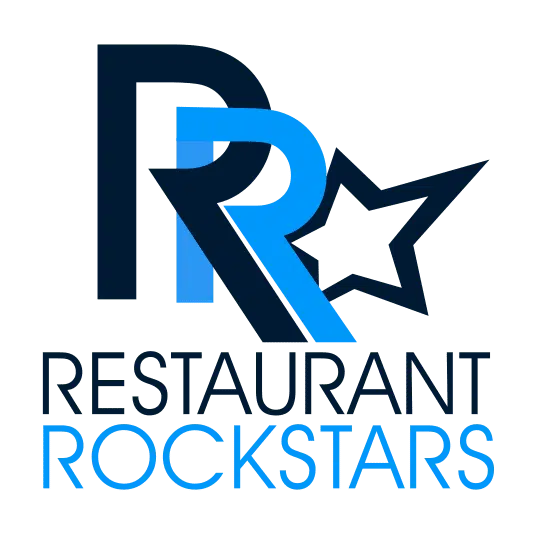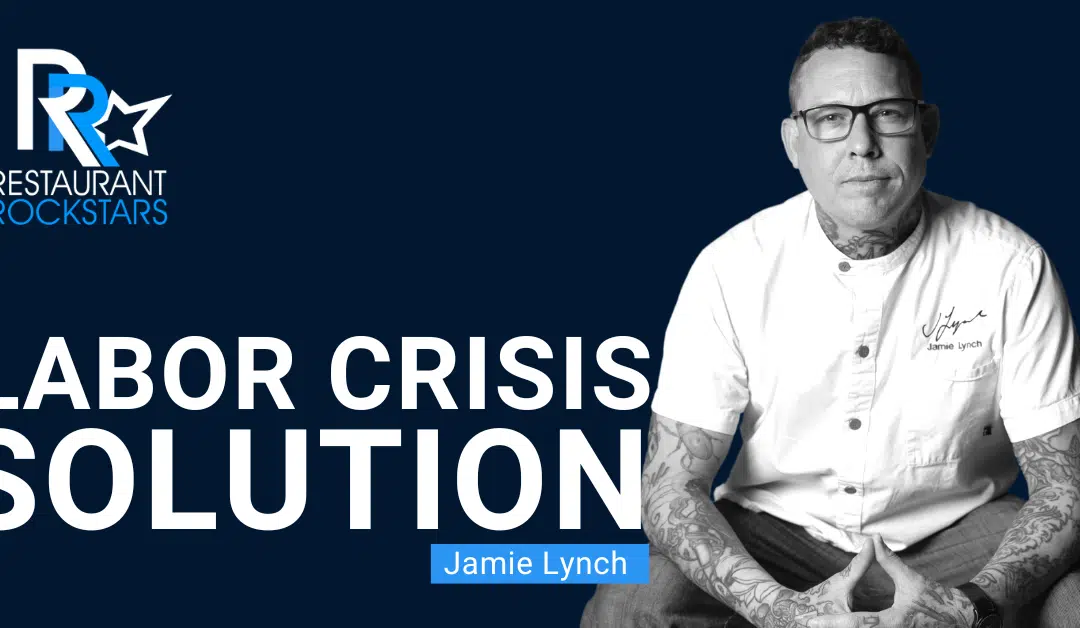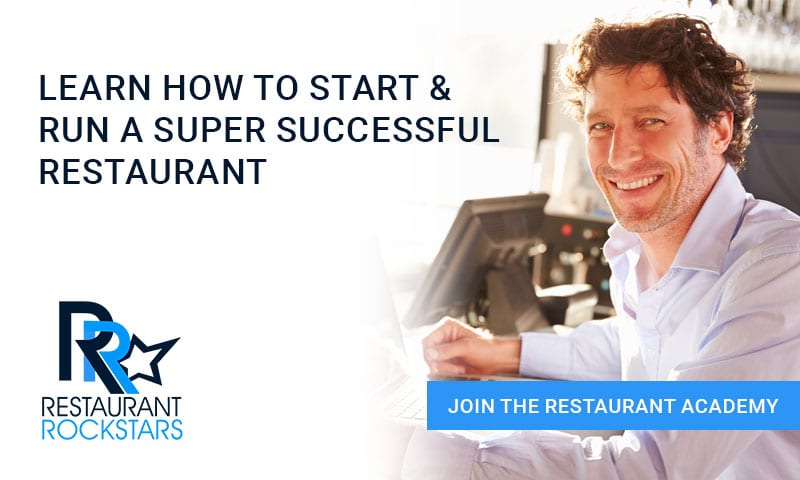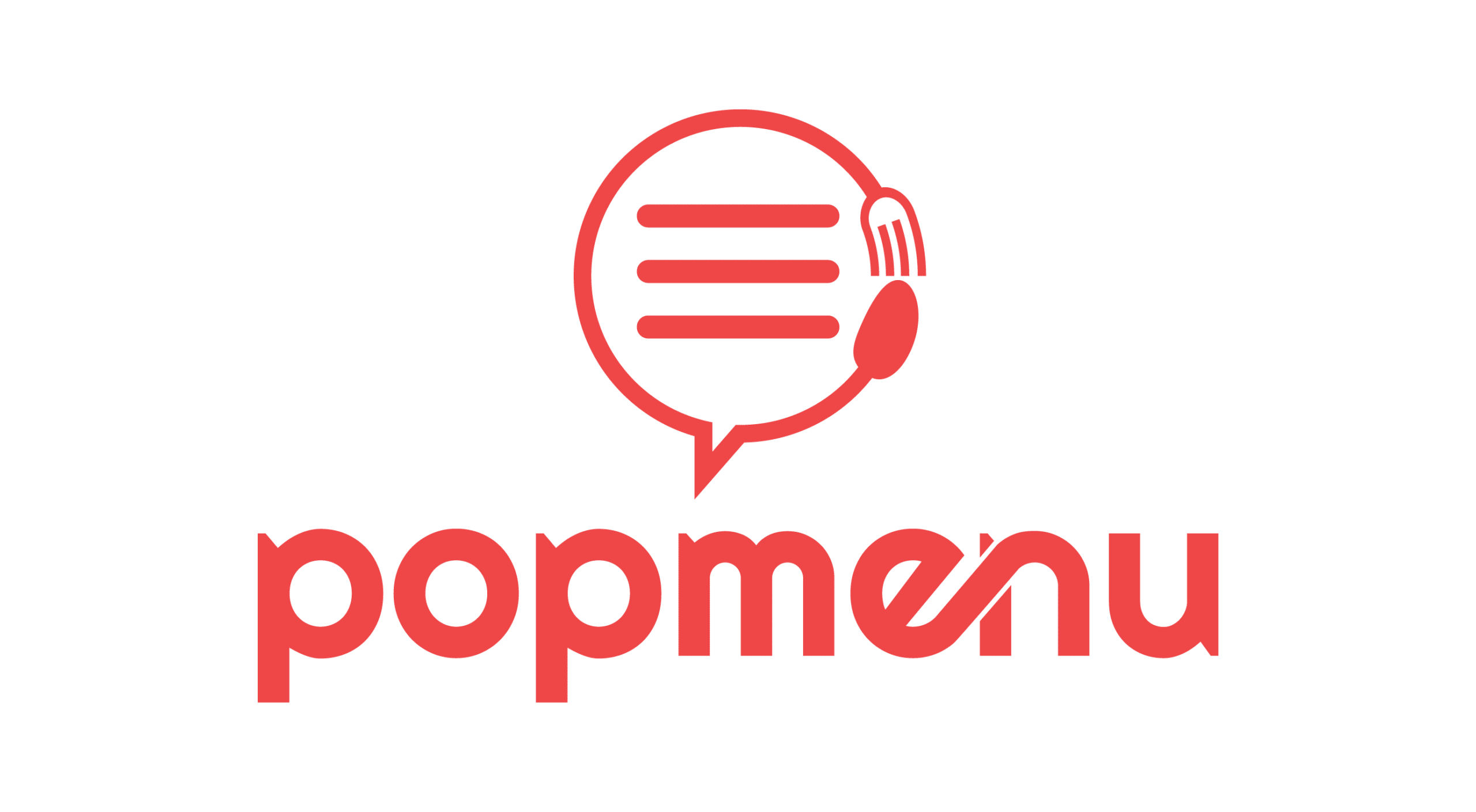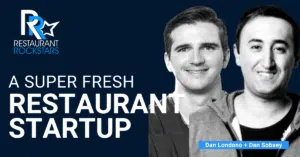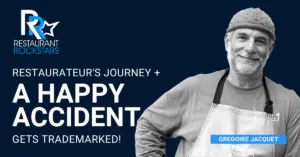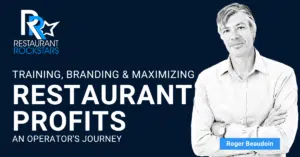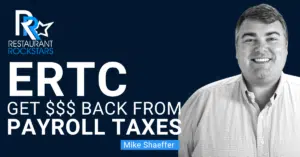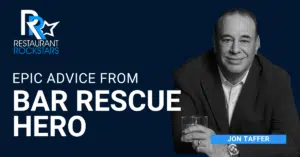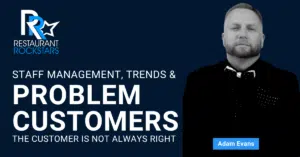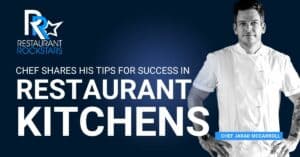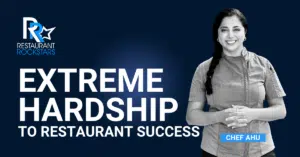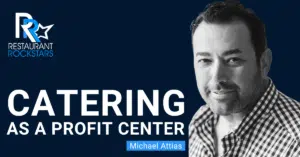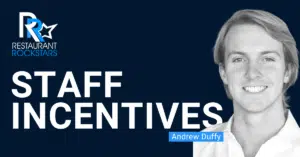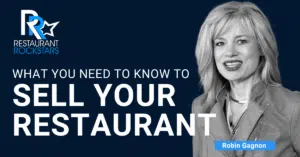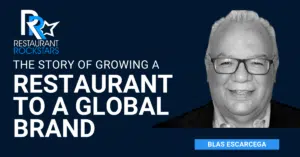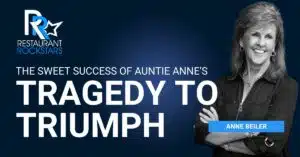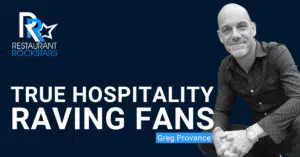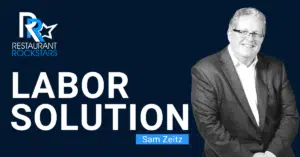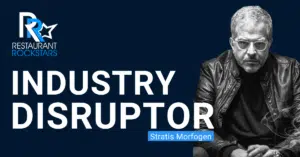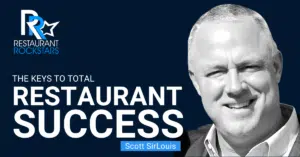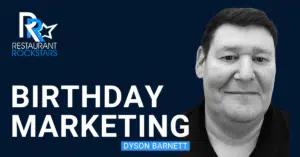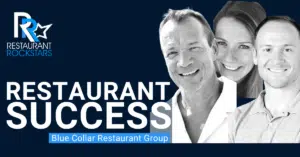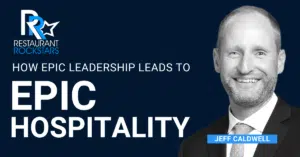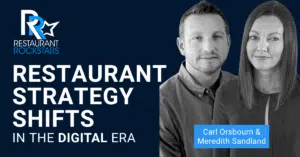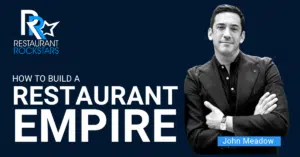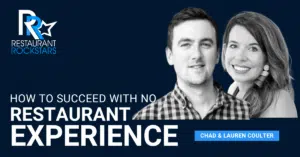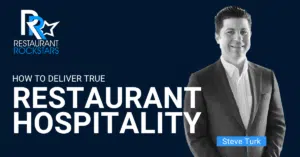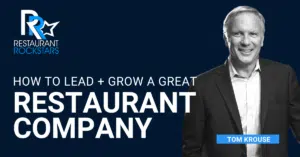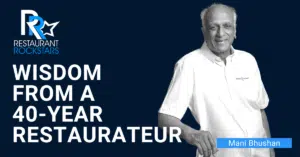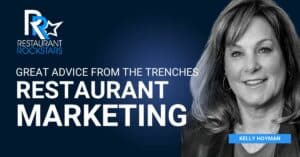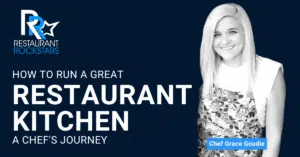Restaurant Rockstars Episode #315
Innovative Solution to the Labor Crisis
LISTEN HERE OR ON YOUR FAVORITE PODCAST PLAYER
Prefer to watch the interview?
Click the video below.
Everyone in hospitality has been hit hard by the labor crisis.
It continues to affect morale, our guest experience, open days and hours and online reviews. There are solutions and we need them now!
In this episode of the Restaurant Rockstars podcast, I am speaking with Chef and Partner Jamie Lynch of The 5th Street Group, a dynamic series of restaurants in Charlotte, Charleston and Nashville.
The 5th Street Group has some very innovative solutions to this Labor Crisis.
Listen as Jamie tell us:
How Recruiting vs. Hiring is one possible solution to your own labor crisis
– The reasons 5th Street Group restaurants are 100% staffed
– Why other restaurants and groups are reaching out for their techniques
– The Ins & Outs of their innovative “Tip the Kitchen” program
– How ownership matches up to $500 per day to beat the labor crisis
– Why guest contributions work and bring in $800,000 in the first year
As well as other challenges and best practices during these crazy times. I hope this episode helps solve your own labor crisis.
Watch or Listen to this episode and then go out there and Rock YOUR Restaurant!
Roger
Connect with our guest
Jamie Lynch – @ChefJamieLynch
5th Street Group – @the5streetgroup
Tip the Kitchen – @tipthekitchen_
Church and Union Charlotte – @churchandunioncharlotte
Church and Union Charleston – @churchandunioncharleston
Church and Union Nashville – @ChurchandUnionNashville
La Belle Helene – @labellehelenecharlotte
Tempest – @tempestcharleston
0:00
To have the entire industry shut down. And everybody out of work. Yeah. And most of them not taken care of very well. Through that whole unemployment process, a lot of people failed. They just said, Hey, man, this is not this isn’t a safe, industry or safe career for me. Yes, amen. So we lost a huge portion of our workforce that way.
0:27
You know, I’m completely inspired by the different innovations that happen in our industry. And I’m super excited to introduce you to this week’s guest, a chef and partner in a very dynamic Restaurant Group that’s making a huge difference with their approaches to the labor challenge. Now you’re gonna want to stick around because they have a new program that it’s called tip the kitchen. So first of all, obviously, there’s been a disparity for years in our industry between front of house back of house, but now the kitchen is being tipped as well. But it goes so far beyond that. This is an innovative program that literally other restaurant groups are reaching out to this company to find out what they’re doing and how they’re doing it. And they are 100% staffed in their restaurants during this labor challenge. So stick around, you’re not gonna want to miss this episode.
1:16
You’re tuned in to the restaurant rockstars podcast, powerful ideas to rock your restaurant. Here’s your host Roger Beaudoin.
1:31
Not answering your phone is one of the quickest ways for your restaurant to lose a potential customer. But between serving in person customers and dealing with the kitchen, it’s hard for staff to prioritize incoming calls. That’s why your restaurant needs popmenu answering simple questions that keep your phone line tied up can be handled without pulling a staff person from your in person hospitality. Reclaim the power of your phone. Popmenu answering is powered by artificial intelligence to answer the simple questions most people call in with like, do you have outdoor seating or what are your hours within the apartment you platform you can customize answers for your restaurant and choose the voice your guests here. Plus create customized greetings. Popmenu answering picks up your phone 24/7 365 days a year turning every phone call into an opportunity. Plus popmenus full collection of tools helps optimize your restaurants website and menu streamlines your ordering experience and assists in retargeting to enable you to build long lasting relationships with your guests. Get help answering your restaurants calls now with popmenu answering. And for a limited time, my listeners can get $100 off their first month plus an unchanging monthly rate at popmenu.com/rockstars go now to get $100 off your first month at popmenu.com/rockstars.
2:56
Listen, I’m all about marketing. But believe me very few marketing ideas today are fully trackable where you know exactly where the business is coming from. And you also know that it’s generating a positive return on your investment. Now I no longer own restaurants. But if I did, this idea would be at the very top of my marketing plan. It’s all about birthdays. Everyone has a birthday and they are a huge Let me repeat that huge source of business in your restaurant. Why wouldn’t you want to focus in on reaching everyone with a birthday in your area? Well, you can with the birthday club from fanConnect. Best part is they do everything for you. You get a turnkey marketing system that sends birthday cards in advance, inviting people to celebrate your restaurant from your area code plus a sign up strategy for your existing customers. New business repeat business hire check averages and a massive customer database. You can get all this with the birthday club. Check it out and sign up now at getfanconnect.com/birthdayRockstar.
4:06
Welcome back everyone. This is the restaurant rockstars podcast with me today is Chef and partner Jamie Lynch of the Fifth Street group, which is seven concepts in Charlotte, Charleston, Nashville and soon to be Denver, Colorado. How are you today, Jamie? I’m doing great. How are you? Thanks so much for being on the show. Man. I think it’s I think it’s awesome that you’re here. And I really enjoy speaking with chefs because you guys are really the heart of what we call the heart of the house. So I think it’s really an interesting perspective to hear all about things from the back of house perspective, but you’re also a partner in this business. So you have operational control, you make decisions. So we’re gonna get in all this and we’ll talk about your concepts, of course, but as my audience knows, I always like to start with the backstory of my guests. So take us back as far as you you know, care to go.
4:58
All right, well You know, I don’t have that, you know, that culinary journey that a lot of chefs have where, you know, my grandmother was, you know, you know, had the whole family around the kitchen kind of thing that wasn’t really my experience. I fell into restaurants. As my first job. I was 16 years old, kind of a punk rocker, hardcore kid getting into trouble. You know, that kind of thing. That was that was my story. And I started at a local bar and grill in Marblehead, Massachusetts, this little like, lobster town on the north shore of Boston, and it was this seedy little bar, you know, the locals bar.
5:40
I may have been in that bar, Jamie, because I’ve got a friend that that’s been in Marblehead a real long time. And really, I’ve been there many times. Are we talking about that downtown sort of harbor area?
5:52
Ya know, so it’s not, it’s not the sale loft or Matty’s? That’s the that’s yes,
5:57
I’ve been I’ve been to both of those places. So Well, anyway, keep telling us your story. I’m familiar.
6:03
This is called the School Street Grill. I started as a dishwasher there. And I fell in love with the, you know, high octane, you know, adrenaline rush of the kitchen. That was my fix. Yeah, I get it. So so that’s what kind of got the hooks in me. You know, the, what I remember the line cook there, you know, is this guy who used to like, make, you know, magic mushroom milkshakes, you know, before the shift and start tripping out and like cooking these burgers. I was like, This guy’s nuts. I can’t believe you can do this in a job. So anyways, that was the thing that got me hooked on the restaurant business. You know, I did that for years started, you know, prep cooking and fry cooking and stuff like that, really the real, you know, kind of nuts and bolts of the kitchen stuff. Later, I moved to New Hampshire, I was working at this up from scratch. This is probably after high school. 18 years old. So a few years later, I started cooking for a chef who at us from scratch Mexican restaurant in New Hampshire. And he started teaching me kind of like, about, you know, marrying flavors and some technique stuff and and at that point, I realized that I had a natural talent for cooking and the kitchen life. He really pushed me to go to culinary school. I decided that if I was going to have any chance at some sort of successful life, I better I better try to find a career. So So I followed his advice. I ended up going to school at necky. In in Vermont, bro. Yeah, I’m familiar. That’s cool. Yeah, New England Culinary Institute. It’s no longer there. But great, great culinary school, seven to one teacher ratio. very hands on and like, you know, mentor styled teaching, which I really did well in, and I excelled there. When I, as part of that program, I had to do two internships. My first internship I did in San Francisco under Michael Mina at Aqua restaurant. And that just blew my hair back walking into that kitchen. You know, Michael was there every night, people that don’t know Michael’s probably one of the most successful American chefs in the country. He’s a, he’s a rock star. But working in his kitchen was my first experience in an upscale fine dining situation. And I loved it. Kind of those guys kind of took me under the wings started really teaching me about upscale kitchen cut operations and cooking. At that point, I realized that people really craved this type of food, these types of experiences. And then that I excelled at it, being kind of a fringe outsider, you know, not very sociable person. I was the kind of kid that was always fighting with people and all that kind of stuff. I realized that through food was a way that I could connect with people in a nurturing way. Without having to be too close, I could still be behind the curtain, you know, taking care of people showing them hospitality without it having to be this kind of close connectivity. And that that to me really was appealing. And I and I went all in. I went all in on cooking from that point and went back to school, finished up my degree in culinary and went to New York City. I figured if I was going to excel at this, you know, I had to learn from the best. So I moved to New York. This was probably 1996 I think and I worked at Le Cirque 2000 in the Palace Hotel.
9:54
Yep. Famous name there for sure. Yeah,
9:56
that was you know, I went from Michael Mina which was like yeah that’s what broke the shelf for me yeah going to the circle was like a legendary situation Oh Sirio Maccioni used to come down the line Yes. During pre shifted like you know pick it your Misa floss and and thank everybody for being me it was magical
10:19
to Dad is so cool. And celebrities back then to write about celebrity restaurant lots of famous people would come in you were cooking for them. I’m sure blades followed but keep going. I don’t want to interrupt your story. This is great.
10:33
Yeah. So yeah ton tons of celebrities. I remember Whoopi Goldberg was one of the ones that we used to he used to come in all the time and regular, total regular. And we would get, you know, we get the server would come in when she sat down said hey, we’ll be here. And we knew what that meant. That meant she was ordering off menu every time roasted chicken right, we didn’t have it on the on the menu with I think it was carrot puree or something. Of course I was the vegetable cook there. So like every every garnish or vegetable that went with, with with the main course was my responsibility. So at that point, I had to scramble off the line and like find these carrots, usually they would come from like, you know, the veal stock, and we would make this carrot puree for her. Anyways. So um, you know, that was an amazing experience. I was there for about a year. I worked under Andrew Carmellini. He was he was the sous chef there at the time, one of the sous chefs, and I worked kind of on his part of the brigade there under him and we you know, he kind of started this mentorship kind of relationship with no he really took it took me under his wing, you know, broke me down and kind of build me back up as a cook. He was offered the job as the Chef de Cuisine at Daniel balloons new restaurant Cafe balloon at the time. Yep. So that was in the old Danielle when he moved Yeah. reopened Danielle and turned the original into Cafe balloon. Andrew went and it was the CDC there. I desperately wanted to join that team. Unfortunately, most of the quotes from the circ moved over with him as they kind of do in New York. You know, they kind of travel in bands like a little pirate. Yeah, enclave? Yes, yes. And there was not room for me on that team at the time. So I went to work for Charlie Palmer, another legend in New York City. I moved up very quickly through the ranks of his kitchen to the rank of sauce EA, so I was kind of a lead line cook at that point. When I got the call from Andrew, Andrew said, hey, you know, they called me monkey back in the day, that was my nickname because the shaved head and the big ears. So it’s like, hey, monkey, I got a spot for you. You want to join the team at Cafe blue? What’s the job Andrew? Veg guy sounds like, Man, I’m going to steps back. I would not let that opportunity pass me up. So I jumped on it moved over. And then I’m working on that team for a few years
13:13
while you’re traveling and rock star restaurant circles here because we’re talking celebrity chefs big name people in the teams that they support. And like you said, it’s like sometimes whole teams will move to a new situation because that is the established Rockstar Dream Team. You know, and you’re part of this in multiple situations. I mean, that is completely inspiring to young chefs listening to this episode right now, just letting you know that with or without a formal education, your skill set your motivation, your desire can take you to the ultimate pinnacle of this business. And you can work for some all around the world anywhere with some really amazing people. And you’re a testament to that. So I’m loving this story so far. Keep going.
13:57
Yeah. 100%. So, so of course, I worked with Andrew for about I think two years. They’re everywhere through the kitchen from I started as the veg guy, the entremet ta Yes, worked my way up to sauce EA, of course, it didn’t take long, I’d already been through the program with them. It was just a matter of, you know, positions opening up, and then moving up into those positions. So I reached the position of tornato, which is, you know, that’s the round chef, you can do anything. You’re kind of like, you know, you’re you’re wherever they need you, you’re there. I did that for a little while. And it was clear to me that there was no sous chef gigs happening in that team. It’s just it’s not it’s not a position unless somebody dies. Gotcha. You’re just waiting, you know, waiting in the wings. Yeah, you got to keep moving. Yeah, so So I did that and an opportunity opened up at a restaurant called Tocqueville on 15th Street right off the Union Square market. For a sous chef, little 40 seat restaurant. husband and wife, owner team. It was an awesome opportunity for me. So I took it. I learned a ton from Marco Marco Moraira was the chef there, they still have a restaurant, I think they moved it to the corner. But anyways, much bigger location. I learned a ton about shopping from the market, cooking features daily, how to approach foods in a more kind of like real simple ingredient driven fashion. And I was there for about nine months when 911 happened. And that
15:33
was just a huge zero right there in the middle of that whole thing. Yeah, I
15:38
was actually in the shower getting ready to go to work when when everything happened. Yeah, I actually got I got out of the shower. And you know, saw the whole second plane situation. It was like, Wow, that’s
15:49
crazy. Crazy. Crazy. So you literally very close by and just the aftermath of that for so long, how it affected anyone who lived or anyone connected to any of those people. And the city itself was an experience. I can only imagine what that was like, but again, keep going. This is awesome.
16:07
Yeah, it was it was crazy man. The city flipped on its head. I mean, it was it was really depressing to be there. We ended up we ended up cooking for rescue workers. We were about four blocks from Ground Zero. Wow, Ground Zero started 11 Street. Yeah. And so we would just go into the restaurant batch out as much, you know, stuff in hotel pants is we couldn’t just take it down and hand it off. Beautiful. Yeah, we did that for about two months. And I just I had to go. I mean, it was the only thing that was happening in New York that I could tell where the bars were packed. Like everybody was just doesn’t that make sense? Yeah. I mean, it was it was terrifying. And while pressing and yep. And there was really no, no clear vision as to like how long things would take and you know,
16:59
like, kind of the pandemic, it’s like, before the pandemic, this wasn’t international tragedy that literally, there were no answers. And it was every single day with something new. And it’s like, yeah, I can only imagine you had no idea what the future as was for your situation. And that restaurant and even New York City really so right. Yeah,
17:18
yeah. So. So at that point, I think it was about February. So it was February of 2002. That I think that’s right, I I decided just to get out. I threw as much stuff as I could into my Chevy caprice classic. And, and I had it parked in Astoria, Queens, I never drove it in the city for anybody who’s been in New York and never drove it just sat there. It was a storage unit. I didn’t move it every couple of days for the street cleaning. But I threw everything I could in there, my knives and everything. And I drove down to Charlotte, North Carolina, I had a friend who grew up in Gastonia, we went to culinary school together in Vermont. You know, he was kind of making moves in the Charlotte scene, and said, Hey, man, let’s let’s do a restaurant together, come down here and let’s figure it out. So I literally drove down, kept my stuff in the car and slept on his couch for a while until, you know, he got engaged and moved out of the house that he was renting and I took it over. So that was that was my move to Charlotte. Craziest thing about that is when I got to Charlotte, I had my resume ready to go. And I pounded the streets, I you know, try to figure out who are the best restaurants in town who the best chefs to work for. And this was just a completely different landscape than what I was used to. There was maybe there was maybe five chefs at that time that were doing like a chef driven restaurant. Everything out was else was corporate steakhouses, chain, restaurants, things like that. Gotcha. So I went around my resume, dropped him off to these people asked to talk to the chefs and I just got shut down. Like I couldn’t believe it. Nobody would hire me
19:08
with your kind of experience on
19:10
that’s what I that’s what I was thinking. Yeah. What are you guys thinking? Yeah, what’s going on? So anyways, I one chef ended up hiring me, Mark Martin. He was he was an alum from my school, had his own little neighborhood American Bistro. You know, saw that I went to Nike and was like, Alright, come on. Looks like you work for some cool guys. Come come work for me. So I ended up working with him and that was great. He gave me a shot. You know, it was me him I think and one other cook in the kitchen. So, you know, I use the term sous chef, but we were really all cooks and dishwashers and prep cooks. But that kind of got my foot in the door. He used all local ingredients. He actually had farmers come to the restaurant and drop off have orders and stuff. And that’s where I met. Sammy Kingsburg. Sammy is a farmer, organic farmer and Charlotte started kind of the slow food movement in Charlotte, the shot the farmers market there, he was kind of influential in that whole movement in the Charlotte area. And this guy blew my mind working for some of these great chefs all over all over the place like these, you know, epic, you know, chefs at the pinnacle of culinary, we had all the best ingredients. I mean, they came from all over the world, we could get anything we wanted, because people would pay for it. But meeting Sammy flipped a switch for me, where, you know, we were using products that literally were being grown 20 miles up the road. And this stuff was beautiful, I mean, gorgeous produce, chickens that he that he raised on his farm, that were just, you know, very well taken care of everything organic. So I started going out to his farm, and on the week when I was off, and just kind of learning about the process and what was going on there. And that really changed my approach to food, which has always been very technique driven based on my background. But but it, it changed my perspective to the ingredients, and how to honor these ingredients in a way where you don’t have to, you don’t have to use these magical techniques to make just beautiful stuff happen on a plate. If you use the best stuff that you can get and the freshest, most, most healthy and nutritious foods they’ll do, they’ll do the artists artistry for you, that kind of thing. So anyways, that that was kind of a seed that kind of happened. That feeds into my later story. At that point, I was working around Charlotte a little bit, I ended up getting offered a job as a chef to cuisine under Bruce Moffat at a restaurant called Barrington. This was a small 40 seat restaurant, it kind of mirrored Tocqueville a little bit. So I was very interested in that, because I just kind of come from that kind of situation. Bruce hired me as a chef de cuisine, he was expanding his operation opening another restaurant, so we needed to kind of focus on that. And I got the opportunity to kind of come in there and really start to stretch my own culinary wings, you know, explore my, my cooking voice a little bit and see what that was going to be. And he was he was great about, you know, letting me lead the team, he taught me a lot about running a business, small business, how to, you know, price your proteins and work with purveyors and, and all that kind of stuff, which I had never done before. So it was great experience. I worked with Bruce for I think three years on, you know, gaining this kind of knowledge and, you know, kind of building my name in the community and getting, you know, you know, my brand out there like my kind of cooking when Patrick Whelan and auditorio, my business partners now kind of reached out to me through or other business partner Mills, who I knew from the neighborhood, he was kind of the designer. I kind of knew him from the bars and hanging out kind of late night situation. And they kind of reached out and said, Hey, man, would you? Actually he I think he’s gonna buy my motorcycle. That’s how it all started. I had a Ducati and he was like, Hey, you got that sweet bike? I’m in Dubai. Yeah, you want to talk? Yeah, I love that bike. But you know, I was hard up for some cash. I had a newborn at that point. And I was like, Yeah, I need to sell my bike. So we got to talk in and he hit me up and said, Hey, look, man, these guys are thinking about starting our own thing.
24:06
And the thing they were starting ended up being five church. With the premise of everything that really sold me on leaving, Barrington is and, you know, teaming up with these guys was was everybody’s background was a little bit different. Every buddy had an expertise in hospitality, that the others didn’t. Obviously mine was cooking in back of the house. Patrick had a lot of bartending experience in front of the house experience as well as a really good brain for numbers and business, which I had, none of Alejandro is when he was a club promoter from New York and really understood marketing and brand development and, you know, that kind of thing, getting like a real buzz around an entity or Our project and in Mills obviously had a really creative designing site. The premise was, why not us? Right? We’re here we’re out here running these businesses and restaurants for people, making them tons of money making them successful. And with none of the glory, right, none of the we’re not at the front of of any of these projects. And why not us? You know, we got the skills to do this. And so we got together and decided we were going to do it. And five church was the the brainchild of that. And that kind of started our road to opening, you know, we’ll have seven restaurants by the end of next year.
25:42
You know, that is an amazing story. And so many things come to mind, we talked about the importance of say business and financial skills, not just having strong culinary talent, we talked about partnering. And for, like I said, young chefs, this is such an aspirational episode, because, again, the inspiration and the things you’re telling us in the story is inspiring people on what is possible. And one of the pitfalls of being a restaurant owner, as our audience knows, and as you know, is people come and go, and it’s a high turnover business. And a lot of restaurants reputations are built and live and die, the chef in the kitchen, right? And all of a sudden, they get a better offer or something happens and they give notice. And it’s like, okay, now I got to rebuild an operation find someone with equal if not greater talent, and then rebuild, or at least you know, damage control to my regulars that have come to expect that style, that cuisine that quality, all that sort of it’s such a problem. And I speak from a restaurant owners perspective, because over 20 plus years, I hired and employed many chefs, and people come and go, and I’ve had these challenges. So becoming a partner is a way that a restaurant if they recognize talent, and someone and future potential, it’s to secure the reputation and the long term success of an operation. And that’s the story you’re telling right now. It’s like you pass some news on the street in numerous experiences, you learn skills from every place you work, and now you brought your best talents to bear on this opportunity that is now growing. And so, you know, it’s two sides of that coin, you know, looking at it from the chef who’s got inspiration and aspiration and ambition that wants to, you know, I think a lot of chefs want to put their name on the door of a place they do. But in order to do that, again, you have to have more than just the culinary skills, I think you need to bring the whole skill set to bear because this is after all, a financial business, which with shrinking margins today, like it’s horrible, you know, with rising costs and labor issues, and supply chains, and all that kind of stuff. So yeah, your journey is a really amazing one. And it’s very exciting. I love that story. I think that was fantastic. So what about cooking influences? What types of cuisine Do you cook when you’re not even working? And do you even I mean, do you love to cook when you’re not literally working? Do you cook for your family? Or do you just wish that someone else takes over the cooking? Because I do enough of it? But what are your inspirations? And what types of cuisines? Do you appreciate the most?
28:26
Good question. So I do love to cook. I am actually just getting back into cooking at home more regularly now that I have, you know, I can’t be in the kitchen every night the way that I used to. I’m not running the shifts the way my chefs are. Now I have an awesome team of chefs working with me throughout our entire operation. So I do actually have the opportunity to cook at home a little bit more now. Which is great because my cooking is totally changed. And that from what I used to cook, which was frozen pizza and you know box macaroni and cheese when I got home, now I’m actually cooking at home. I’m actually you know, going through processes and stuff. As far as inspirations. Cultures are what inspire me. I you know, I’m classically French trained by my, you know, my my pedigree, obviously, I like that’s my roots. And perseverance is to Yeah, yeah. And I’m pretty old school, like I’m learning a lot about some new technologies and stuff in the kitchen that is opening up some doors for me and like keeping me inspired because, I mean, up until a couple years ago, I mean, I was still you know, smoking meats in a in a you know, in a hotel pan, you know, smoker made it you know, kind of this rigged up smoker device. And the technology these days is just amazing. That’s, you know, these kitchen tools and new technologies to cook with. So a lot of my younger chefs are kind of like, help mold you know, teaching me about these technologies which is opening up my I cook a little bit, which is a lot of fun keeps me inspired. But, you know, to answer your question about the inspirations, it’s it’s cultures, I go through phases where, like, for instance, when we were opening our stores in our restaurants in Charleston, I was researching Lowcountry cuisine, and the history of low country and the slave culture. And yes, you know how a lot of that stuff came from West Africa, which led me down this rabbit hole, where I was just like gobbling up everything I could learn about West African culture and cuisine and farming techniques, and all that kind of stuff. And I started cooking with a lot of like field peas, and rice, and, you know, all these kinds of like, chilies and things that we didn’t have around here. And that and I go through phases like that, you know, so like, for a year and a half, it was like, everything had this kind of West African vibe going on, as I was exploring that. And then it just kind of changes over time. So I just get inspired by whatever cultural things going on, that I’m interested in, and I just go for it. That’s how I connect with stuff.
31:07
That’s yeah, I mean, how cool is that to keep I mean, it is experimentation, too. And you will apply a certain style to your cooking, but then a new inspiration will maybe turn that on its head, and you’re going to totally adapt your style to a new culture or cuisine. I mean, God totally see, it never gets boring. It’s a constantly evolving quest to, to excel and to dazzle the public with your creations and to inspire the people that work under you. And to keep everything elevated and to stay relevant in one of the most competitive businesses out there. I can’t think of anything more exciting. That’s, that’s true, but it
31:47
is super exciting and never gets old. That’s
31:51
right. So your group, your Restaurant Group is literally creating careers, not just jobs in the industry. And that is such, such a strong approach to this business. Because like I said earlier, this traditionally has been a high turnover business where people come and go, and my success came from building what I call the dream team staff. And that was a certain leadership style that I had and recognition and rewards and constantly nurturing and developing my people. And, and, you know, everybody works for a paycheck, right? But people really work for knowing that they’re contributing to something greater than themselves, and that they feel that they, they fit there. And there’s a chemistry amongst that team. And that people are recognized for their achievements. And those achievements. And those ideas that they bring to the table are actually encouraged. And I believe that’s the difference between management and leadership. You know, managers delegate and tell people what to do. And true leaders inspire and nurture and develop and give people room to fail and recognize and reward great achievement. And that’s what keeps the staff and longevity versus turnover. And obviously, you guys are at the forefront of doing that. So let’s talk about let’s start with a labor shortage and why restaurants have been hardest hit in this in this whole labor crisis. Because all industries are struggling with finding great people, restaurant industry, perhaps more so. And then let’s sort of flip that and figure out why your Restaurant Group is 100% staffed right now you’re recruiting with no challenges whatsoever, and your restaurants have taken on a really unique approach. That is sort of the crux of where we’re going with this. So take take us there.
33:36
All right. So I don’t have all the answers. First off. I don’t, I don’t know exactly why our industry has been the hardest hit. I do know that, you know, our industry is made up with a lot of different people on different different kind of parts of the path of their career, right. We have some people that are just kind of, you know, it’s their their first job or you know, their job while they’re in school trying to figure out what they’re going to do. We have some career people we got, you know, managers and chefs that are dedicated to hospitality and have that gene that they can’t shake. And so this is very business there. Yeah, this is their calling. And then everybody in between, and, you know, to have the entire industry shut down. And everybody out of work. Yeah. And most of them not taken care of very well. Through that whole unemployment process. A lot of people bailed. They just said, Hey, man, this is not this isn’t a safe industry or safe career for me. Yes. And so we lost a huge portion of our workforce that way.
34:49
Devastating.
34:50
Yeah. And and so I think that’s the biggest thing, I think, right would agree. I think our industry has been broken. For forever, I think that the labor force model has been broken the back of the house versus front of the house kind of pay scale situation. The fact that our margins are so tight, it really limits our ability to for to spend labor dollars with three very careful about, you know that equation. And so during the pandemic while we were closed, Patrick Alejandro and I all moved into a house together, this five bedroom house, all the hair was actually on Isle of Palms. And in Charleston, which is one of the barrier islands. I actually had to sell my farm I opened our organic farm with my fiancee, we were, you know, supplying organic produce to the restaurants I had to close that because of the pandemic itself the land. Wow. And it was just like, Yeah, I mean, we were just we were all restaurant rich and cash poor. We’ve, we’ve got these great, you know, restaurants and stuff and things going on and cash flow, but um, you know, as soon as everything closed, that all came to a halt, we’re like, Oh,
36:14
get everything you need for your operation with Smithfield culinary. Their extensive portfolio lets you serve up a wide variety of proteins to keep your patrons happy. Choose from smokin fast, which lets you add barbecue to your menu without adding a pitmaster to your payroll, or browse their Margarita offerings encompassing everything you need for pizza toppings, plus a variety of specialty Italian meats like capicola prosciutto and salami. Finally, serve what you love with Smithfield, which includes everything from bacon, to hotdogs to deli meats and so much more for the products and solutions to keep your operation running strong. Visit Smithfield.culinary.com.
36:53
How long did that last? And was that state required closure for a certain period of time? And then it got back sort of slowly? Did you have to pivot multiple times. Tell us about your pivots and what actually happened to your group during that time? I think there’s still key learnings there because for sure restaurants are still continuing to pivot with the labor crisis with Okay, I got some government bailout money. I’ve spent all that it’s like businesses booming, I can’t staff my restaurant, I gotta close several days a week, even though and I’m losing revenue because I can’t be open seven days. You know, it’s there’s all these challenges right now. So yeah, tell us about how awesome okay, so
37:35
So yeah, so So anyways, the the, the vacation rental market went out the window. So we got this great lease on this house on an island, we all moved in together that was like our, our bunker or home base. And we started really looking at what was going on. We’re watching the news all the time trying to figure out how we were going to survive this. The benefit that we had was having a church in union and restaurants in multiple states. So we had North Carolina, South Carolina, and we were working on the Nashville market. We were actually under construction here at that point. So each state had different things going on. South care, it lasted for about a year that we were that was just under a year, I think that we were closed in Charleston. Charlotte was closed for a year, because it was very conservative. A lot of banking uptown. Like, I mean, banks are just still coming back in full force now. So like, uptown Charlotte was was a ghost house, we didn’t even really think about that. We were trying to do takeout and things like that, like most people did. But Charleston actually had a little bit looser restrictions and stuff. So we were able to do a little bit more there, which really helped carry us through this. I mean, if we weren’t doing a little more business in Charleston, we would have really suffered. We did open Tempest at the, at the very beginning of the openings. So that was in first quarter, like first quarter. 2020. That’s right, or 2021 I don’t have my dates are all messed up. But like that March, we opened, Tempest. And it was very slow. I mean, we’d already built it. I mean, we were on the tail end of of building this thing out when the pandemic happened. Gotcha.
39:40
Gotcha. No turning back. You’re committed equal speed ahead. No, no other choice but yeah, we’re like
39:45
we just got to open the doors and hope for the best. Yeah, and that was an epic challenge. I mean, we, if we don’t if we did not have the team that we have today, we would be we would just be so far up the creek. But everybody put their Their focus into that. Luckily, we didn’t have to juggle what was going on in Charlotte, you know, how do we how do we keep our staff employed here? Why don’t we do all that? So we could focus on getting Tempest off the ground, which is what we did. Man. Charleston slowly started to open business was not great. But there was some cash flow, which allowed us to kind of, you know, pay some people, we did get the PPP funds, which without we would be belly up, I was oversaturation, no question. If they had not passed those bills, we would be done. Yeah. So we got by the skin of our teeth, we kind of were able to navigate all that. And I gotta give Patrick credit for that. I mean, he was just all over the bank accounts, the like money that we had, either, you know, the cash flow when we close to, you know, just
40:55
Yeah, you had to be I mean, you had to have a, you had to have a, you know, pinpoint accuracy as to what your losses were and what your decrease in revenues were, you had to be first in line to press the go button. When all these programs are starting to get rolled out. You had to fill out the applications, you had to be accurate about that timely about that. And you had to be ahead of what’s the next thing coming because hold a lot of people heard about this stuff coming, but they were late to the plate, and they didn’t get the money. And it’s like, that was my situation. You know, there was so many different programs happening simultaneously. And it’s like, I committed myself to diving into all of that, and making sure that so yeah, it sounds like Patrick did the very same thing. And yes, yeah,
41:38
I want to present. And I gotta give him credit, man. Because like, yeah, and I think that’s a lot of why there was so many losses, like restaurant losses, because, you know, a lot of these chef driven places, you know, if the chef’s are not business savvy or not, ya know, they’re not all over their numbers and their bank
41:56
accounts and overwhelming really, yeah, it’s,
41:59
it’s, I’m all about the team, like, You got to have a team of people. And because you can’t have your eye on everything all at all times. And yeah, so anyways, we were we were able to secure that. And that really helped helped us bring staff on, you know, we were paying people abbreviated pay, because we had to make it last. And that was another thing that we did is we we had to ration it out. We said okay, fine. If this is all the money we have, and Charlotte is closed, and you know, we’re only bringing in, you know, some leavings every week in Charleston, we got to make this money last for a year, right? This could be a This could take a year for us to brag, you had no idea. Yep, no clue. And so we really rationed it out, we were open with our teams, we said, hey, guys, this, this is what we can afford to do. You know, we don’t want to lose you. But this is the best we can do. And if if you know, if that works for you guys, like come out, we’ll find something to do, which will make food for for school lunches, we’ll do like whatever we have to do what we’ll put ourselves to work. And, and that was really the key to kind of get through it.
43:13
That’s an awesome story, too. Now, let’s talk about tip the kitchen, because that’s sort of at the heart of what your current success with staffing and morale and team building is really all about. And it sort of addresses the, the traditional, maybe disparities in pay in an industry that has long affected, like you said, of the inability to pay people necessarily what they’re really worth or to maintain margins. And all that stuff is is affected. So tell us about the program? What was the brainchild for that program? What did you learn along the way? Is it refined? Are you still tweaking it? Just take us through the whole thing?
43:55
Yeah. So you know, I think it obviously it all stemmed from the pandemic. I mean, the worst day of our lives was was having to let go of our staff. Yeah, I know, we had to do it for their own good, like we needed to, we had to make them eligible for, you know, for the first time, unemployment and stuff like that. So we had to do it. But I mean, that’s something I never have done and would don’t ever want to do again. Yeah. And so, you know, I think, you know, I have always felt undervalued, underpaid, you know, I’ve always made less than my counterparts, either on the front of the house or whatever. I think Patrick identified that I think he realized that there was this, you know, kind of frustration is underlying, you know, discrepancy and fairness between what the front of the house servers who you know what I work a lot less than maybe the the back of the house staff, I don’t want to say they work less hard because of me being a frontline, like I, you know, they work hard. Every with
45:12
every restaurant job is hard and demanding and challenging. But the kitchen works under what what some would say would be more challenging conditions Extreme Home, and you’re on your feet for long shifts under extreme heat, and burning oils and all sorts of hazards in the front of house doesn’t have to deal with, you know, yep, yep.
45:32
Totally. And, and so, yeah, and they make quite a bit less and they don’t wreck tipped And so yes, you know, so I think the the, the idea was in with, you know, understanding that the industry is not a safe industry for career growth, right, you know, an industry that can disappear in the blink of an eye is going to be scary for people to really invest their energy and time into. So we needed to find a way to a pay our people more, they the back of the house employees need to make a livable wage, they have to be able to put food on the table have have transportation, you know, enjoy their life. I mean, at the end of the day, what are we all doing here, you know, you have to be able to, to enjoy it. And, you know, worrying about whether your job is going to be there tomorrow, worrying about whether or not you’re gonna make enough to, you know, take care of your kids, you know, send them to summer camp or whatever, like, we just we realized that we were part of the problem, you know, we were part of this problem where we had these numbers, these labor percentages that we had to hit. And as a result, like we were under paying our staff, you know, there’s another way to spell it out. And so we dedicated to change that we said, we got to find a way to even this out. And so Pat started looking at a lot of different models. You know, how do we do we raise prices, you can’t do that you can’t raise prices, because now we have to raise our prices across the menu, and then industry that’s already suffering. So now we’re alienating even a bigger population of our clientele by raising our prices, you know, we want to keep our concepts are available to everybody and everybody be able to come and enjoy it. And and value
47:28
is a huge part of that equation, you know, under percent, and it’s not the guests responsibility or issue of what a company’s financial situation is. They simply want value for money and to be provided with service and a great experience.
47:44
Totally 100%. So there was that equation. So we said, okay, can’t raise prices. So that’s not that’s not the actual we can’t just pay them more. And then the idea of tip the kitchen was born. And how do we make that happen? And that was a long road. I mean, there was a lot of legal things we had to look at. There’s a lot of labor laws, you can’t you really can’t share the tips from traditionally tipped employees with traditionally non tipped employees. That’s no, that’s, that’s right. No, no. Yep. We learned we so we had to really dive in and break down the number all your bases, figure out how it worked. And so we decided to give this tip the kitchen a try. It works. Amazingly, we’ve raised let’s see over $1.6 million for our teams on top of their pay. Since we started tip the kitchen back last April. So just over a year 1.6 million. I mean, it’s it’s crazy. The way it works is this, there’s a couple rules. One, it’s voluntary. Okay, you don’t have to do it. It’s not mandatory. It’s not a service charge. It’s If your experience is worthy, we ask you to consider leaving something for the back of
49:05
the house. Is that how it’s communicated? And is yet on a guest check. Do the servers talk about it? Tell us about the communication to the guests.
49:12
It’s printed on the menu. It’s actually at the bottom of the menu. It says tip the kitchen, boom, here’s how it works. And then we urge the we urge the staff to explain it. They do not sell it right there. There. They are trained not to sell this tip the kitchens that we don’t want people to feel guilted into leave. Yeah, it’s completely optional. Sure, has to be completely optional rooms.
49:36
It doesn’t work. Okay.
49:39
You know, we’re not asking for handouts, we’re asking, we’re asking that if we if we do a great job, consider it. Okay, so that’s the first rule. The second rule is that that we match. So ownership group we match up to $500 per day for the back of the house. per, per day,
50:03
any restaurant, right? Any restaurants does that? Yeah, yep,
50:07
each restaurant got so let’s say in in Charleston, they they get $200 and kitchen tips, we throw in 200. It’s 400 in the back of the house splits evenly. everybody participates sous chefs, line cooks, dishwashers, everybody.
50:25
So let me ask you a question. That is an awesome concept. But there is still and I’m not saying this is in your restaurant group. But let’s just take any restaurant there are, there is sometimes a disparity between the contributions that people make and their work ethic and the reliability and their challenges. Now, if that were ever to occur in your restaurants, or in any restaurant that is thinking of adopting this is, is there any adjustment made for a player’s versus B minus players versus C players?
50:58
Know, now our team know if they’re on our team, we’re hoping they’re there at least a
51:03
B. Okay. There you go. That’s,
51:06
yeah, it’s, you know, what, actually, it helps the team kind of self regulate. You know what I mean? Like, yes, the team doesn’t want
51:15
slackers on their team, right? So it elevates everything.
51:19
It helps them hold each other accountable. I love that. People aren’t working. They’re like, bro, you’re on. You’re on the,
51:25
and you’re making an equal share this you got to step up your game, buddy. Yes, sir. So there’s this. There’s this self? Yeah. So is it Yeah. And how that worked. That is very interesting. And that’s a cultural thing, too. But it’s up leveling the whole, you know, the whole operation? That’s, that’s very cool. Keep going. This is very interesting stuff. Yeah.
51:48
Okay. So that’s the second rule. Third is there’s a stop gap. So the stop gap is to, you know, one thing that that we thought about early on in that pack kind of devised this stopgap for was, we didn’t want the front of the house employees to feel that they were being penalized by us adding a tip line to the check. Right. So now they have to share their tips with the back of the house. So what we do is what we call the stop gap. And that is, if a guest splits a check, right? They do. They split their tip a half goes to the front of the server half goes to the back of the house.
52:29
So it matters percentage, you’re saying like if it’s a 20 or 25% tip or whatever it is, some people may choose to 5050 the front of house versus the back of house.
52:39
Correct. We will do is we will elevate the front of the houses. percentage to 21%. Okay, yeah. Okay. So over 20. Yes. So if they were left in 18% tip on their own, they actually do better by sharing with the back of the house because we elevate it to 21%. I understand. Okay, yeah. So there’s a lot of cost involved in this and a lot of math involved on our end, back of the house kind of administrative end in a financial investment on our part for this to work. But we can talk about that in a minute, because we’ve done all the analysts on that tracking. And we we see that it’s really not. We’re not it’s not really elevating our operational cost much not 1%. We think so but we can talk.
53:28
That’s incredible. How long is the program been going, Jamie?
53:32
So we it’s been a year see? So about 14 months? I think so just a year and a few months?
53:42
Yeah. Yeah. And I think it you’ve, I think something that I heard about this elevates people’s earnings by say 15k a year, which is extraordinary in this busy. Realistic, yeah. Baco Yes. Right. That’s
53:57
totally, totally, I mean, there are some line cooks and sous chefs that are making as much as I made my first year as an executive chef, this It’s bananas. It’s totally bananas. And I’m super proud of that. You know, that is what I wasn’t paying myself much. But I was also you know, as also a partner and looking out for the business. But the fact that these, you know, entry level hospitality positions can earn a wage that affords them, you know, a livable wages. It’s just something we’re super proud of.
54:36
Man, what a pioneering effort this is.
54:39
Yeah, it’s been it hasn’t been easy. And also getting people to believe it has been hard. You know, I’m getting employees to believe it getting potential people applying for work to believe that it’s real, you know, almost they’re like, they’re like, is this like, I don’t believe it like an owner’s like Taking care of the people and like, none of this is like a real thing. We actually talk to our staff. Yeah, do a Stosh, you know, go spend dual working interview, talk with the people see how much they’re making, see if they like working here, like, you know, get in there and check it out, interview them.
55:15
So is that leading to increased applications and now you’ve got a pool of people. And and, and literally the longevity means you don’t have a lot of openings that you’re creating, because you’ve got 100% retention, and you’re, you’re continuing to elevate the people that are there, and you’ve got a big pool to pull from if you lose somebody for whatever reason, is that what’s going on? Yeah, no, there’s word on the street, though about this. It must be right.
55:41
Yeah, there’s a little bit of word on the street. So we do get people, you know, calling the restaurant directly and saying, hey, you know, I want to hear more about this, you know, I want an opportunity. We know it’s, there’s not a ton of that, surprisingly enough. And we were still getting, we’re using a lot of the the regular avenues that people use, you know, indeed, and Facebook and all these different things. So I don’t think our pool is particularly bigger than anybody else. But we do have an advantage. And I think that’s what’s really helping us. Yeah, he’s definitely helping us.
56:16
Let’s talk about the reaction to the guest when you first rolled out this initiative, and I’m hearing that it’s overwhelmingly positive. Now people are understanding people are very supportive of this. And they’re, they’re just, if they’re a fan of your restaurant in your group, then they’re they’re on board with this, but when you first rolled it out, because it is sort of a foreign concept that is extremely rare, but I do see it being a model for the future. And you’re you’re leading the way on that. But what was the initial reaction? And how did that go?
56:48
It was mixed. I mean, we like you said, you know, people who knew us as a group, or were, you know, familiar with our brand and what we do, we’re all supportive, they were all about it. Yeah, we did get a lot of kind of kickback from some people, why don’t you just pay your people more? Why do we have to do it? They don’t want you just raise your raise your prices, all this kind of stuff. And, you know, which we anticipated? We kind of figured that would happen. You know, not everybody is a hospitality. terian. You know, some people they want, they want their stuff. They want it now they want it cheap.
57:27
Yeah, well, those
57:28
aren’t the people that we are catering are busy.
57:31
No, no, no, that’s true. And obviously, when you build that kind of reputation, it’s like, This is who we are. This is what we believe in. That’s part of your mission statement. Right. And that’s communicated to the team. And it’s like everyone stands behind that unifying voice. And your and your loyal regulars, your guests, even first time visitors, that jump on board will stay loyal. And it must have led to interesting online reviews too, right? Yeah. What do you mean, in social media? What are you seeing on TripAdvisor and Yelp about this? It must have popped up and it must be a continual thing. Are you seeing that’s overwhelmingly positive? Also,
58:13
it’s definitely overwhelmingly positive for sure. Most people are the people that actually take the time to read, you know, how it works, that we actually match whatever they put down. So it’s, you know, they’re actually they’re getting a discount on their, on their tipping, right? Like, if you were going to match it, so your dollar goes twice as far. That’s, that’s
58:34
a beautiful thing. Yeah. And so like, I
58:36
think people that actually read it, and think about it and get behind it are like, hell yeah, this is great. Like, look at you guys taking care of your people like that is a model that we need, that everybody should kind of be looking at, right? How do we take care of people better, so they work harder in an environment that they’re proud of? Like, you get better productivity? Like, it’s just, it’s overlooked? whelmingly positive for most people, we still get the people that, you know, have a snarky comments, or, you know, why should we have to pay your employees kind of thing, and we just, you know, we just, we swipe it away, you know, not everybody’s gonna get it, they don’t understand how it works. Exactly. And, and I bet if any of them, you know, took a moment to ask our staff, how it affects their lives, it might change their, their perspective. You know, you know,
59:27
it’s got to be No, I’m absolutely convinced in positive that the morale of your team absolutely translates to the guest experience.
59:39
Totally in 100%
59:40
You know, what I mean? And it took
59:42
it does it because in there also it gives them some responsibility, you know, it gives them the like, control most right like, like if we if we all focus today if we if we put out the best food we put out ever we can earn more today, right? It gives than this, like, they’re engaged in a way that they weren’t before, right? It’s like, oh, I make X amount of an hour. So like this is this is how much effort I’ll put in. So they’re connected to their, their potential earnings in a way that gets them engaged. The team works amazingly, together now like to me, when I, when we first launched it, I would say maybe in the first month, right, as we’re still rolling it out, we had problems with the accounting of it, like trying to figure out how to move the money from the tip line to the
1:00:32
to the guests, and do it legally.
1:00:34
Sure. Like you, man. Yeah. Yeah, we had someroadblocks and issues that we had to sort out. So, you know, the first few weeks were a little little jumbled. But once we got working, and smooth out, and consistently, you know, started building and building and then the staff receiving the funds. I mean, the kitchen like walking into the kitchen was like being in a an alien place. I was like, What’s going on here? You know, like, why is it like, you know, people will like, come on. Hey, thank you, Chef.
1:01:05
It’s good to see I’m like, really? Okay, cool. Like, I’m into that. So yeah, the morale is great. The team is motivated for the most part. You know, you’ll always have your your issues on that front. But But yeah, the morale is awesome. And, and honestly, the morale between the front and the back of the house is awesome to like, huh, they are a team, right? The server’s realize that shit, like having that extra tip line doesn’t hurt them, it potentially helps them.
1:01:37
Right, right. But right, it opens up the lines of communication. And I mean, I know from experience that there is sometimes a challenge between front and back of house. And there are certain front of house people that are intimidated to talk to the back of house when something goes wrong on the floor in the heat of battle. And now it’s like it levels the playing field. And it puts everybody in literally the same mission moving forward to work together as a team, like you say this, this is really, really incredible, because it’s covering so many different bases at the same time. And working wonders for your operation. This is we
1:02:15
believe it’s a total game changer. And yeah, we believe it’s yeah, I believe is the future for hospitality.
1:02:23
I do see that, you know, and all it takes is one Restaurant Group to move on to other groups and other independent restaurants. And they find a way to follow your model into an I think that’s going to uplevel hospitality across the board.
1:02:38
Well, let me tell you what we’ve done. So. So Pat started a Twitter feed for tip the kitchen, I think it’s at tip underscore the kitchen, on Twitter, and we literally laid out all the entire program. I mean, it’s I gotta
1:02:58
put that shownotes to this up. Yeah, please. I know, this audience is like hanging on every word. Because it’s intriguing. It’s compelling. It’s like you said, it’s the next logical solution to this labor challenge. I mean, yeah, yep. So I want to share this every way possible. So in addition to your social media channels that we also put in shownotes, and people listening, I think that Twitter handle is very explanation and I want to definitely drive people to that, but keep going if you have more, please.
1:03:27
Yeah. So yeah, so on that Twitter feed, I mean, it literally lays out, you know, the rules how we, you know, the kind of the ethos of tip the kitchen. Yeah, you know, how we actually employ it, the mechanics of it. I mean, literally, the spreadsheets around there, we’ve posted the numbers like it is all there for anybody who’s interested. And we don’t want this to be a prop proprietor, you know, proprietary thing we want really believe that for our industry, to improve to get healthier to be for sustainability. This is a model that can really help get us there.
1:04:07
It’s a model, but it’s also a movement. You know, you guys are on the ground floor of like disrupting and turning the entire business model of restaurants and hospitality upside down for the better. That’s what I’m, that’s what I’m hearing. That’s what I’m seeing. I’m getting it as an as a former operator with so much experience that wow. I never, I mean, I had some of the issues we talked about, and we had our own ways of dealing with it, but not to this extent, but not to have this kind of long lasting impact, you know, has a
1:04:38
lot of like, that has, you know, the positive impact kind of like balloons out right. You know, the initial the initial plan was like, we need to level the disparity in the pay between front back in the house like that was the initial thought, right. We need this to become we need our back of the house staff to make a livable Ah, like that was planning since the start. Yeah, but all of the other positive things that have come out of this, I mean, the the camaraderie and morale in the back of the house, the productivity has gone up, like, through the roof, like our productivity is I mean, I don’t, I can’t imagine it’s probably in the high 70 percentile, which is an if anybody know, that’s a good, that’s a good productivity.
1:05:24
Yeah, sure.
1:05:27
Um, let’s see what else? Yeah, there’s just like, the quality of the product that we’re putting out is amazing. The inspiration of the team, I mean, the chefs, the chefs themselves are creating more interesting food. I mean, the quality of our food is through the roof. You know, that, that the connection between the front and the back to the house, kind of like healing, that kind of divide, has been a game changer that we didn’t expect. We hoped for, but like, you know, who knew how it would go. And then, you know, our retention. I mean, people just don’t, they don’t quit, like people are enjoying their jobs, or they’re more positive, they’re happy to be there, which speaks to your point that you’re not everybody’s there for a paycheck. Like a lot of people. They’re making good money, yes. But they like where they work, and they take pride in it. And that’s, that is a huge motivator for people. That’s the
1:06:27
difference that we talked about earlier. It’s not a job. Now it’s a career, there is an upward mobility, there is recognition, there is appreciation, there is opportunity. And you might even move people around amongst your restaurant group. If somebody wants to move to Charleston, or Nashville, or Denver, whatever, you’re creating opportunities for your great people to keep going in this business.
1:06:50
Yeah, I mean, our goal, our our understanding of this is that if we if we are not profitable, and if we don’t expand our operations, this movement won’t take hold. Like we have to be the ones to grow it as other restaurants kind of see that it’s working and see our, our, you know, our expansion, they’ll say, hey, maybe we’ll adopt this. But we believe that like, you know, opening in Denver, you know, another restaurant in Nashville, we’ve got to come in on the way as we open these and implement this school, which is going to start, you know, ballooning it up. Yeah. So staying profitable, keep moving forward, keep, you know, growing, our operation is going to help this thing kind of really take hold.
1:07:34
Fantastic. So let’s wrap this up by saying we’ve covered so much important ground here. And I was hanging on every word. And I know this is a really big episode for our audience. What would be your best advice to operators that have been through the pandemic, they’re still standing maybe by by a thread, they survived, you know, and they’re still going, they’ve been beaten up really badly. And they got to rediscover that pride in the passion that you clearly exemplify with your in your partners? Of course, what’s your best advice to people just to keep going because better days are ahead? This is one possible solution to the labor crisis. But moving forward, you’re in this business for a reason? What would you say to those people?
1:08:19
I mean, I would, you know, my, the thing I would say is that this is the hospitality business and not the restaurant business. You know, if you if you went into this business to make millions man, like, cash out and do something else, we’re in this business for people. So put people before profits, you know, focus on the hospitality and you’ll make it look out for your people. And they’ll look out for you.
1:08:43
Awesome. Thanks for sharing all your insights, your expertise, this business model, this, just everything that was so inspiring about this episode. Thank you so much, Jamie, for being with us. That was there. Yeah, go ahead.
1:08:55
Thanks for Thanks for having me and sharing our story. We really appreciate it.
1:08:59
Now. I appreciate you being a great guest. That was the restaurant rockstars podcast. Thanks, audience for tuning in. We hope you all stay well, and we will see you in the next episode. Thanks, Jamie for being a great guest. I’m so inspired by your company’s philosophy on creating careers, not jobs. And we learned so much in this episode, and it’s no wonder why other restaurant groups are reaching out to you to figure out what you’re doing because there’s definitely magic happening in your restaurants. And you know, I was really pleasantly surprised because I was at a food show a week or so ago down in Charlotte and I was just wandering the downtown area what a beautiful city it is. And I stumbled across one of your concepts Labelle Helene, now I had a plane to catch it was about 10 In the morning you open for lunch at 11 I so wish I had the opportunity to experience it. But I had to take a photo through the window because the ambiance just drew me right in it was so you know, beautiful and I just so wanted to be part of that experience. And when I come back to Charlotte, I’m definitely Gonna try, LaBelle, Helene and possibly some of your other concepts. Thanks so much for that. Thanks also to the sponsors of this week’s episode. Pop menu Smithfield culinary the birthday club and serve the restaurant training app. Can’t wait to see you all next time. Don’t miss our next episode.
1:10:19
Imagine both your front and back of house teams are so well trained that they’re executing flawlessly. Your front of house is doubling your sales, boosting repeat business and creating five star dining experiences while your back of house is consistently preparing each dish to perfection on time and to spec having a restaurant this dial takes a unique trading system. That’s where SRV comes in. SRV means steady restaurant variety, and it is a powerful mobile training system custom built to meet the needs of your restaurant. SRV will uplevel your team’s knowledge and skills, maximize your profits and create experiences that guests will rave about. Picture this before the doors open for business. Susan, one of your managers is assigning SRV Training to Paul your new bartender. Using the app he will learn both food and beverage ingredients allergens, romance notes and pairings. She shows Paul how to use serves interactive study tools to become a master of the menu and how to use the cocktail database to easily find specs to make any drink. He can’t wait to hit the floor and sees how served will unlock his hidden sales potential. Susan will be able to track his training progress and test his performance. I’ve got this Paul says next Susan just uploaded a brand new appetizer to the serve menu using the admin dashboard using serves menu profit tools. She’s determined that this new dish will have a major positive impact on the restaurants bottom line if the team is able to sell it. So she makes it a priority sale item and get your front of house team on board to suggest it throughout the night. Meanwhile, in the kitchen, Steve your line cook pulls out his phone and use a serve to see prep notes on the new appetizer offering. Allow he says here are all the ingredients the cooking steps and a photo of the plate presentation. This makes it so easy to learn this dish. Sally your server returns to her table with drinks and says may now suggest you start with our new signature appetizer. It’s the perfect complement to the chef’s fantastic lobster special tonight. The pairs wonderfully with a bottle of White Haven Sauvignon Blanc. That sounds wonderful. The guest says we can’t wait to try it. Sally learned these suggestive sales by studying pairings unserved. Serve also allows you to uplevel your management team with a comprehensive restaurant academy that includes efficiencies, inventory management, cost controls, and maximizing profit, menu engineering, proven marketing solutions and more. SRV includes everything needed to develop your managers into rising stars in your operation. As the leader of your organization, you take pride in continuing to uplevel your operation and your team. You know that by investing in your people, jobs become careers, and everyone in your team feels empowered to perform at their best. As you can see, the possibilities with serve are endless. Serve is the key to unlocking your restaurants hidden potential, and will prove that the more your team is able to learn the more your restaurant will earn it and it’s a game changer. Ready to get started at SRVNOW.com.
1:13:46
Thanks for listening to the restaurant rockstars podcast for lots of great resources, head over to restaurant rockstars.com See you next time.
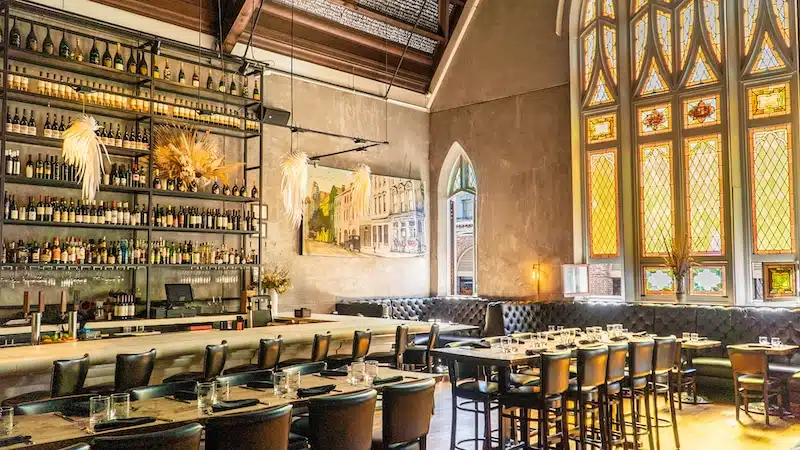
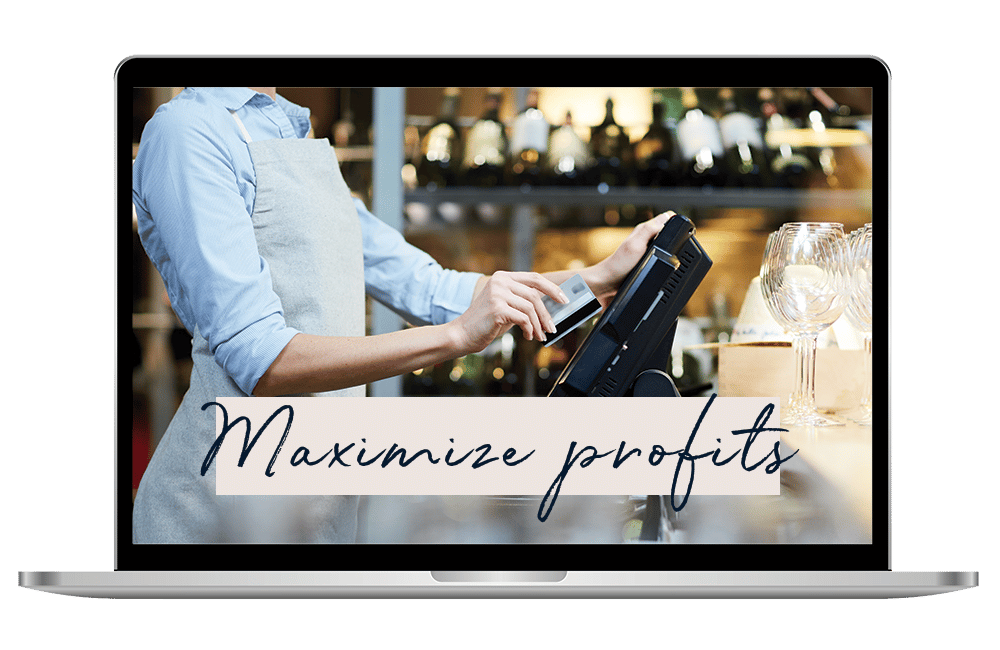
The three costly mistakes you could unknowingly be making?
Find out in this FREE guide and restaurant assessment specifically designed to reveal the unexpected hurdles standing between you and exponential business growth.
Thank You To Our Sponsors
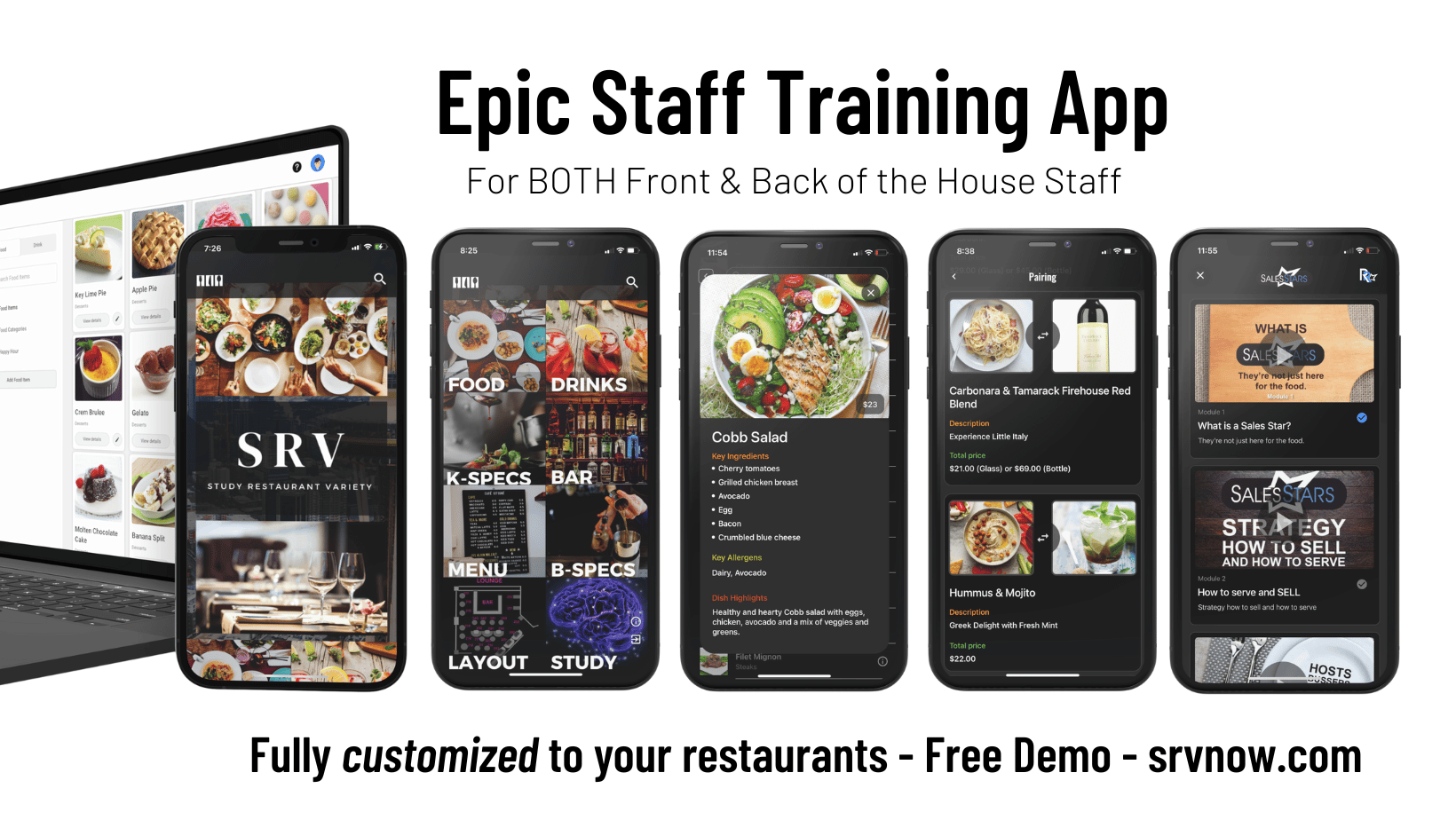
SRV teaches your team to profitably sell and accurately create the food and drinks at your restaurant.
Unlock Staff Potential and Maximize Sales
For a limited time only, popmenu is offering our listeners $100 off your first month plus an unchanging lifetime rate.
Request a DEMO:
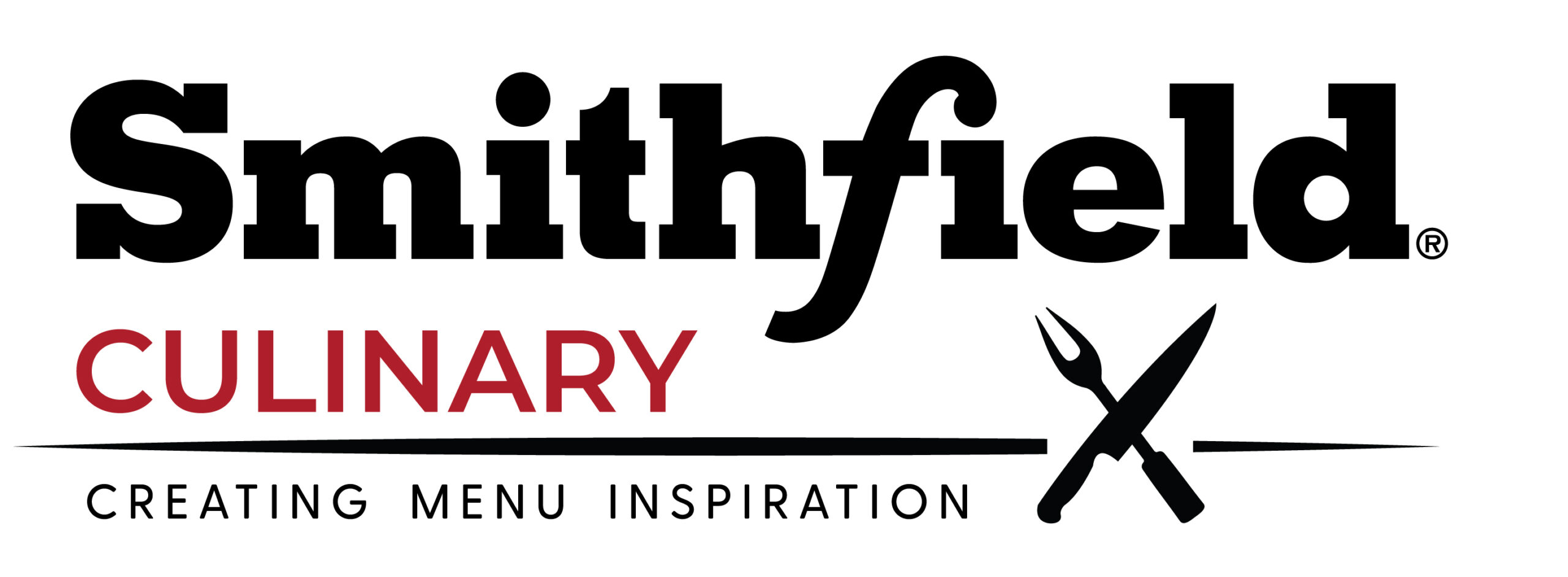
Inspiring Head-Turning Menu Creativity
Culinary Trends & Chef Inspired Recipes - Learn More
Want to become a podcast sponsor?
Please get in touch with Roger at roger@restaurantrockstars.com
